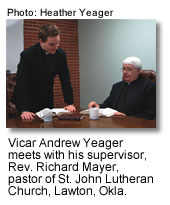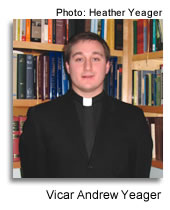by Andrew Yeagar
Vicars are not pastors yet, but the vicarage year is a great and valuable time for the formation of a pastor. Vicars serve as they learn, and in doing so, they learn how to serve.
As I stood shoulder-to-shoulder with some of my closest friends in a dimly lit sanctuary, waiting for our names to be read from the list of vicarage placements, I anxiously wondered about the church and the location that would be paired with my name. Where would I be assigned? What would it be like? Would I fit in? Would I succeed—or fail?
Perhaps I should tell you a little about myself. I was born in Baltimore, Md., where my parents raised me to love city life. To me, the bustle of city streets, the cosmopolitan commingling of cultures, the endless list of varying types of coffee—it’s all invigorating. Recently, I married my wife, Heather, and she graciously agreed to leave her small town (Caro, Mich.) to join me at Concordia Theological Seminary in Fort Wayne—in the city.
Now, for the next year, where would be our home?
My friends went before me: California, Florida, Wisconsin, Louisiana—and then I got the news: “Andrew Yeager, St. John Lutheran Church, Lawton, Okla.”
 Needless to say, I was surprised. Oklahoma? I had never even been to a state that borders the state of Oklahoma. I had never been west of the Mississippi. I didn’t own a pair of cowboy boots. The closest I had ever come to a buffalo was in burger form. Could I really do this?
Needless to say, I was surprised. Oklahoma? I had never even been to a state that borders the state of Oklahoma. I had never been west of the Mississippi. I didn’t own a pair of cowboy boots. The closest I had ever come to a buffalo was in burger form. Could I really do this?
But through the many kindnesses and encouraging words we received upon arrival, I quickly learned that Lawton was a wonderful place to be prepared further for my life’s work. By serving St. John’s, I’ve learned that churches can be as different as the people in them: They face different challenges, share different talents, are called to do their work in different fields.
Lawton is the site of Fort Sill, the U.S. Army’s massive field-artillery school. St. John sees families come and go as soldiers are deployed, sent home, or transferred. For this reason, it is a fluid congregation in a city of often temporary residents. Because they come and go on a regular basis, there are multiple opportunities to engage people with the Good News of Jesus, both inside and outside the walls of St. John. We work the harvest fields while the Lord gives us the opportunity, even if our window of time with any given person or family is short.
I’ve learned, too, that the message of the Gospel, which I so eagerly desire to study, learn, and preach, is the same Gospel that congregations eagerly desire to hear. The Good News that Jesus saves sinners is the source and strength of all the Church’s members, even novice vicars. Even before I set foot in St. John, I already had something in common with the good people here.
Moreover, vicarage is no solo act. It is rather more like an apprenticeship. My supervisor, Rev. Richard Mayer, has been the pastor here at St. John for 24 years, and he is the quintessential example of a faithful pastor. He also has great interpersonal skills and the ability to make anyone feel welcome and at home. This is obvious whenever we walk into a fast-food restaurant (an activity we do a lot). Someone invariably approaches us with a smile and a hand-shake, someone to whom Pastor Mayer has ministered over the course of his or her life just by being a dutiful servant of the Lord. Watching Pastor Mayer day in and day out makes it evident that warmth and a generous spirit are useful tools when we are called on to approach a soul with the Gospel—whether we are a pastor, another churchworker, or a layperson.
I have realized, too, that the Holy Spirit stretches our comfort zones. It may be as simple as leading the youth activity in which we distributed batteries for fire alarms door-to-door in Lawton neighborhoods, sharing a little about our Christian faith in the process. As you might imagine, the responses were all over the map. I was taken aback by the courage and the eloquence of our youth group. Our Lord can use any of His servants for His mission, whether young or old, including vicars.
What have I learned about myself and my calling during my vicarage year? One of the many good things about being a Lutheran is our rich heritage. It supplies us with innumerable tools to help us learn, grow in, and share the faith we confess. The solid, Christ-centered Confessions, the Catechism, and works of numerous reformers as well as the fathers of our own Synod give us a foundation that is firmly rooted in Holy Scripture and filled with the sound resources needed to tackle any contemporary issue.
Personally, I could not survive a day in the office without these tools, and I am convinced these reference points are indispensable for any Christian, clergy or laity. We are well-equipped with God’s Word as it speaks through the Church throughout all the ages, including our own.
No, vicars are not pastors yet, but the vicarage year is a great and valuable time for the formation of a pastor. Vicars serve as they learn, and in doing so, they learn how to serve.
When the Lord gives, He does so abundantly. My vicarage experience here at St. John has surpassed all my expectations. I am thrilled to return to Concordia, Fort Wayne, finish my final year of preparation, and return to serving my Lord, God willing, as a pastor.
Andrew Yeager will return to Concordia Theological Seminary, Fort Wayne, this fall for his final year of study in preparation for becoming a pastor in The Lutheran Church—Missouri Synod. His home congregation is Nazareth Lutheran Church, Baltimore, Md.
Heeding the Call: Challenges, Yes, but Abundant Grace, Too
 Many people who consider the pastoral ministry and the four years of study that precede ordination see the road as daunting and filled with challenges. We have personal doubts about our unworthiness to serve in such a high calling, and we don’t see a way through it. I don’t know a pastor or vicar who hasn’t given thought to his own unworthiness. But we bring to God our unworthiness and our emptiness, and He fills us with the Gospel.
Many people who consider the pastoral ministry and the four years of study that precede ordination see the road as daunting and filled with challenges. We have personal doubts about our unworthiness to serve in such a high calling, and we don’t see a way through it. I don’t know a pastor or vicar who hasn’t given thought to his own unworthiness. But we bring to God our unworthiness and our emptiness, and He fills us with the Gospel.
It is true that no one deserves or is worthy to be called a pastor. It’s only through the grace and mercy won for you by your Lord and Savior, and the forgiveness He offers you daily, that you can face the long road ahead. A vicar is never alone; rather, he is dependent entirely upon God, and God gives him the proper motivation to serve under Him.
If anyone is considering the ordination track, here are a few questions that might aid your consideration:
- Are you an active participant in the study of God’s Word in your local congregation?
- Do you serve others with God’s Word, say, as an elder or a deacon?
- Has your pastor or some other churchworker recognized your determination and zeal for the Holy Scriptures?
Don’t overthink your likes or dislikes, your preferences or your personality. Pastors come from various backgrounds, have diverse talents, enjoy different things, have different dislikes, and span the personality chart. What matters is God’s call through the Church, that is, what God does with us and says to us—that’s what counts. Pastors are God’s vessels to preach and teach what God says by “rightly dividing the Word of truth” (2 Tim. 2:15).
If you are considering the holy ministry, I want you to know the joys and blessings of the journey are well worth the years of preparation. Right now, the future might seem opaque, but be encouraged! The Lord in His Divine providence works all things for good, and your future is in His hands.





